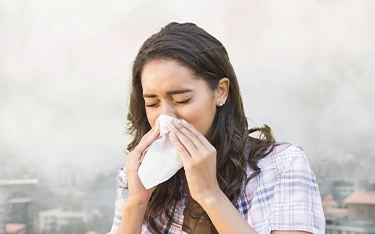Waking up with a stuffy nose, itchy eyes, or a cough? It could be more than just seasonal allergies. Pollution-related allergy symptoms are on the rise, especially in cities. India ranks among the top countries affected by air pollution, with daily exposure to PM2.5 and other pollutants worsening respiratory issues.
This blog will help you spot early signs, manage symptoms, and explore natural care. At Dr Batra’s®, personalised homeopathy strengthens your immunity and reduces sensitivity to pollutants, offering safe, long-term relief without side effects.
How Pollution Affects Your Allergies
What Triggers Pollution Allergy?
Pollution allergies are not caused by the weather alone. They are triggered by harmful particles suspended in the air. Common factors include:
- Particulate Matter (PM2.5 and PM10): Ultra-fine dust particles that enter your lungs and bloodstream, leading to inflammation and respiratory distress.
- Vehicle emissions: Nitrogen dioxide and carbon monoxide can inflame airways, worsen asthma, and trigger allergic reactions.
- Industrial smoke and smog: These release toxic pollutants like sulfur dioxide and volatile organic compounds, irritating the eyes, nose, and throat.
- Construction dust and open burning: Dust from construction sites and smoke from burning waste can carry allergens that aggravate respiratory allergies. (burning fields).
- Toxic gases and chemical fumes: Exposure to formaldehyde, benzene, and other fumes from household cleaners, paints, or factories can trigger allergic symptoms and skin irritation.
- Burning fields: release pollutants that often trigger allergic reactions.
In metro cities like Delhi, Mumbai, and Bengaluru, PM2.5 levels frequently exceed WHO’s safe limits, especially during winter, making allergy flare-ups more common.
Does Air Quality Affect Allergies?
Yes, poor air quality directly affects the severity and frequency of allergies. Air pollution can worsen allergic rhinitis, asthma, and sinusitis and even trigger flare-ups of eczema, hives, and eye irritation. People with existing sensitivities, children, and older people are especially vulnerable.
Insights from a global study
A study published in the RSD Journal reviewed 17 articles (2000–2019) on homeopathy for chronic allergies. It found that 14 studies showed positive outcomes, suggesting homeopathy effectively reduces chronic allergy symptoms.
Symptoms of Pollution Allergy
If you're wondering whether you have a pollution-related allergy, here are some symptoms of pollution allergy to look out for:
- Sneezing fits or nasal congestion
- Itchy or watery eyes
- Persistent dry cough
- Shortness of breath or wheezing
- Fatigue or headaches
- Rashes or itchy skin (especially face, neck)
- Frequent throat irritation
If these air pollution allergy symptoms keep returning during high AQI days, you may be dealing with a pollution-triggered allergic response.
Tips to Manage Pollution Allergy
How to Manage Pollution Allergy
Here are some practical ways to reduce exposure and manage symptoms:
- Use N95/anti-pollution masks while stepping outdoors
- Install air purifiers indoors to improve home air quality
- Avoid peak traffic hours and areas with heavy construction
- Take steam inhalation and drink warm fluids regularly
- Wash face and eyes after coming home from outside
- Stay hydrated to flush out toxins
Dr Batra’s® pro tip:
Avoid outdoor exposure during peak pollution hours, wear an N95 mask when stepping out, and rinse your nose with saline water daily to flush out pollutants. Combine this with personalised homeopathic care for lasting relief.
Homeopathy for Pollution Allergy – A Natural Approach
Homeopathy addresses more than just the surface-level symptoms. It works by:
| Symbol |
Benefit |
| Boosts Immunity |
Strengthens your body’s natural defense against allergens |
| Reduces Sensitivity |
Minimises allergic reactions to pollutants over time |
| No Side Effects |
Offers a safe alternative to conventional anti-allergy medicines |
| Personalised Remedies |
Tailored to your lifestyle, stress levels, and genetic factors |
At Dr Batra’s®, our doctors use advanced tools, such as AI-driven skin and respiratory analysis, to find the root cause of your allergy, ensuring long-lasting relief..
Homeopathy treats pollution allergies in a safe and natural way from the inside out.


